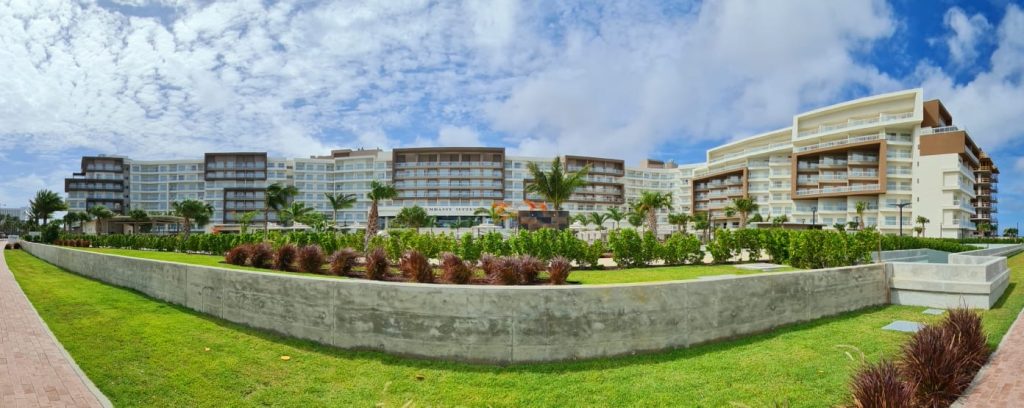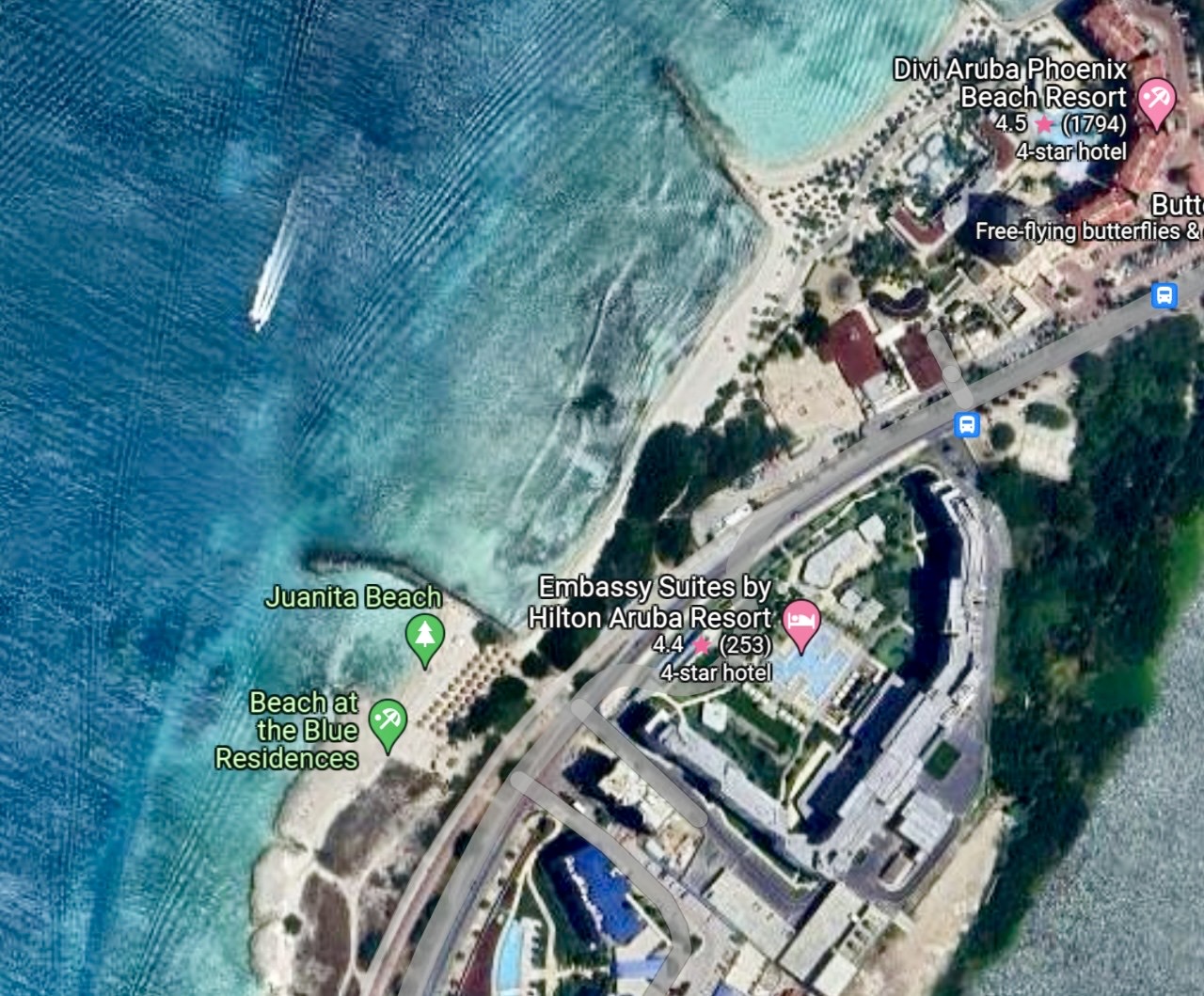Embassy Suites’ Appellate Court Decision: A Phyrric Victory
In the recent appellate court decision on Embassy Suites, there was a notable disparity between the governmental and the resort’s claims of victory and the actual rulings. Despite the government’s optimistic assertions, the appellate court largely upheld the findings of the court of first instance, emphasizing issues of environmental preservation and legal compliance. This case has become emblematic of the complex interplay between development, governance, and environmental stewardship in Aruba.
The Journey So Far
The Embassy Suites case has traversed a convoluted path through Aruba’s legal system, gaining significant attention due to its environmental implications. The case initially centered around the permit granted to Natura Development N.V. for the construction of a beach area and related facilities adjacent to the Embassy Suites hotel. This permit, however, was contested by the Aruba Birdlife Conservation (ABC) group, who argued that the development threatened protected natural areas and species.
In an earlier ruling, the court of first instance sided with ABC, determining that the permit was invalid as it contravened the spatial planning regulations outlined in Aruba’s Ruimtelijk Ontwikkelingsplan (ROPV). Specifically, the court highlighted that the proposed developments within the “Marine Zones” were incompatible with the area’s designated environmental preservation purposes.
For more insights on the court’s earlier rulings and analysis, refer to my previous articles:
Embassy Suites: Building Beyond Boundaries
Embassy Suites Beach Plans Raise Concerns
Embassy Suites Loses Another Case in Court
Embassy Suites: A Case of Poor Governance or Poor Management?
Clarifying the Appellate Court Decision
Last week, I gave an interview to the news channel Enfoke to clarify the appellate court’s decision, ensuring that the audience receives an accurate account of the ruling. In this interview, I highlighted the court’s emphasis on environmental preservation and legal compliance, countering any attempts by “spin doctors” to distort the court’s decision.
This column serves a similar purpose, providing a detailed analysis of the appellate court’s ruling to prevent any biased or misleading interpretations. It is crucial for the public to understand the true implications of the court’s decision, as it sets a precedent for future cases involving environmental and governance issues in Aruba.
The Appellate Court’s Decision
In the most recent appellate court proceedings, the court confirmed many of the first court’s findings but also introduced some key distinctions. The appellate court agreed that the development within the “Marine Zones” was inconsistent with the ROPV’s objectives, which prioritize ecological and cultural preservation over construction activities. This reinforces the original ruling that a permit for such developments cannot be issued unless substantial environmental safeguards are ensured
However, the appellate court provided a nuanced view regarding the “Beach Zone” developments, indicating that permits for beach construction could potentially be issued under strict conditions aimed at mitigating environmental impact. The court underscored the necessity for environmental exemptions and protective measures, especially considering the potential risks to local flora and fauna, including the Yerba di Caña.
Understanding Yerba di Caña
Yerba di Caña, scientifically known as Thalassia testudinum, is a species of seagrass found in the waters surrounding Aruba. This important marine plant plays a crucial role in the local ecosystem by providing habitat and food for a variety of marine life, including fish, sea turtles, and invertebrates. It also helps stabilize the sea floor and improves water quality by trapping sediments and absorbing nutrients.
In my previous article, Embassy Suites Beach Plans Raise Concerns, I emphasized the critical nature of protecting Yerba di Caña from the potential destruction caused by construction projects like those planned by Embassy Suites. The seagrass beds are not only biodiversity hotspots but also serve as a natural barrier against coastal erosion and climate change effects. Destroying them could have long-lasting detrimental effects on Aruba’s marine environment and overall ecological health.
Embassy Suites’ construction activities, particularly those involving the alteration of marine zones, pose a significant threat to these seagrass beds. Any damage or removal of Yerba di Caña could disrupt the delicate balance of the marine ecosystem, leading to loss of habitat and species that rely on it for survival. This is why the court’s insistence on environmental safeguards is paramount to ensuring the sustainability of Aruba’s natural resources.
A Permit in Limbo
One significant aspect of the appellate ruling is that the permit, which was initially contested, has now expired, rendering it ineffective for Embassy Suites’ current operations. This expiration necessitates a fresh permit application by Embassy Suites, which must address the court’s environmental stipulations comprehensively. Notably, this includes maintaining the integrity of the marine zone by prohibiting constructions like piers unless an exemption is granted.
The possibility of such an exemption remains contentious due to its likely irreversible impacts on the marine ecosystem, which could disrupt local biodiversity and alter water dynamics in the area.
Pyrrhic Victory: Embassy Suites’ Empty Claims
After the appellate court’s decision, Embassy Suites (also) quickly claimed victory, but the celebration seems premature. While they might have spun the ruling as a win, the reality is that they have made no tangible gains. Before the appeal, they couldn’t build a pier or a beach, and nothing in the recent decision changes that. The restrictions remain firm, leaving Embassy Suites in the same position as before, unable to proceed with their planned developments in the marine and beach zones.
This situation underscores a critical point: the appellate court has upheld the necessity for strict environmental safeguards and compliance with the Ruimtelijk Ontwikkelingsplan (ROPV). The decision reinforces that without these measures, any attempt to alter the protected marine zones is off the table. For Embassy Suites, this is less a victory and more a reminder of the formidable challenges that lie ahead in their development ambitions.
Legal Posturing: Threats of Lawsuits
In response to the court’s decision, Embassy Suites has also floated the possibility of suing both the Aruba Birdlife Conservation (ABC) group and the government for damages. However, having reviewed all the decisions in question, it seems doubtful that they have a legitimate basis for such claims. This appears to be more posturing than anything else.
The rulings have consistently highlighted Embassy Suites’ lack of compliance with environmental regulations and their premature construction activities without the necessary permits. These factors significantly weaken their position for any potential lawsuit. Instead, it seems like an attempt to deflect attention from their own shortcomings and to pressure both the conservationists and the government into acquiescing to their demands.
Ultimately, this threat of legal action may serve more as a public relations strategy than a viable legal tactic. It’s crucial for the public and stakeholders to see through this facade and focus on the underlying issues at stake: the preservation of Aruba’s environment and the adherence to legal protocols designed to protect it.
The Endless Drama: A Legal Soap Opera
The ongoing saga of Embassy Suites has all the makings of a classic soap opera: dramatic court battles, environmental showdowns, and a cast of characters that keep viewers on the edge of their seats. If only there were a theme song to accompany the legal twists and turns, we’d have a prime-time hit on our hands!
Imagine the courtroom as a stage where developers, environmentalists, and government officials engage in a theatrical performance worthy of Broadway or our Cas di Cultura. Each side passionately delivers their lines, hoping to sway the audience—or in this case, the judges—to their cause. All that’s missing are the dramatic pauses and cliffhangers before the commercial breaks.
One can almost picture the spin doctors furiously typing away behind the scenes, crafting narratives that would make any seasoned playwright proud. “Will justice prevail, or will the developers find a loophole?” the voiceover might announce, teasing next week’s thrilling episode. And let’s not forget the court’s role as the steadfast director, keeping the plot (mostly) on track and ensuring that the show goes on. The appellate court’s decision is the latest plot twist, leaving everyone wondering what will happen next in this ever-evolving drama. Perhaps, in a world where legal sagas like this one can sometimes feel interminable, it’s good to find a bit of humor in the chaos. After all, if life is a stage, the Embassy Suites case is surely one of its most intriguing acts.
Environmental and Governance Implications
Embassy Suites’ initial commencement of beach construction without the requisite permits starkly highlights a governance lapse. This action demonstrates a blatant disregard for regulatory processes and underscores the necessity for stringent oversight and enforcement by government authorities.
Moreover, the role of the Minister of Environment has come or at least should be under scrutiny. The minister’s inaction regarding exemption decisions has contributed to the ongoing legal uncertainty. By failing to either approve or deny the exemption, the minister has allowed the matter to escalate into a prolonged judicial conflict. This scenario underscores the need for decisive governance to avert similar situations in the future.

Moving forward
The Embassy Suites saga serves as a poignant reminder of the delicate balance between development and environmental stewardship. As Aruba navigates these challenges, the Minister of Environment must prioritize ecological preservation over short-term economic gains. This entails making prompt, transparent decisions regarding permits and exemptions, thereby providing clarity to stakeholders and safeguarding Aruba’s natural heritage.
The minister must fulfill his mandate to protect Aruba’s environment, prioritizing nature over tourism and economic interests. It is imperative that the minister takes a firm stance, making timely decisions to prevent prolonged legal disputes and environmental degradation. Embassy Suites must obey the laws and not attempt to develop its plans without proper permits in hand. The community must remain vigilant to this and other developments that could have an irreversible adverse impact on our nature. Let us hope that this case catalyzes a shift towards more sustainable development practices in Aruba, ensuring that nature prevails over competing interests.
Visit me
I invite you to visit my new website, www.lincolngomez.com, where you can find all my blogs and podcasts for further insights and updates on Aruba’s environmental and governance issues. You can also follow me on social media for more discussions and the latest news. Stay connected and be part of the conversation!
For further insights into Aruba’s environmental conservation efforts, visit the Aruba Birdlife Conservation.













